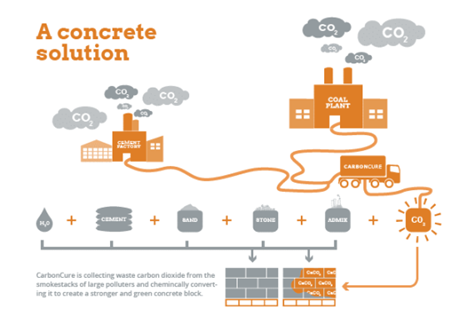Carboncure Concrete
Carbon dioxide gas is known as a greenhouse gas which causes global warming. Carbon dioxide or CO2 are produced from several activities such as forest burning, industrial activities, and smoke from motor vehicles. The population on Earth is increasing which results in increasing activities that cause air pollution by CO2.
A Canadian startup invented CarbonCure technology in an effort to reduce carbon dioxide emissions in the infrastructure sector. The way the technology works is by capturing exhaust gas, namely carbon dioxide produced by local industries, then processing it at CarbonCure’s cement factory, producing liquid carbon dioxide. The liquid is injected into the wet concrete mixture, undergoes a chemical reaction with calcium ions, forming a mineral, namely calcium carbonate (CaCO3) which is permanently embedded in the concrete. Thus, carbon dioxide cannot be released back into the air, because it has turned into minerals.

This reaction converts carbon dioxide into minerals that can increase the compressive strength of the resulting concrete. The results showed that concrete produced with CarbonCure technology showed similar performance, with a reduction in cement composition of five to eight percent compared to standard concrete. Concrete properties such as slump value, moisture content, and temperature also do not change significantly so this technology allows the production of good quality concrete with less cement usage.
One example of a building that uses concrete with CarbonCure technology is 725 Ponce, an office center located in Atlanta, Georgia. According to Christie Gamble, one of the senior directors of CarbonCure, this building has succeeded in reducing emissions of 680 tons of carbon dioxide into the atmosphere, the equivalent of the carbon dioxide absorbed by eight hundred hectares of forest in a year. “If this technology were spread around the world, we could reduce about seven hundred megatons of carbon dioxide per year. This amount is equivalent to a reduction in the use of 150 million cars per year.


Comments :